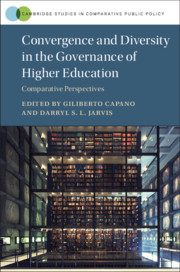Book contents
- Convergence and Diversity in the Governance of Higher Education
- Cambridge Studies in Comparative Public Policy
- Convergence and Diversity in the Governance of Higher Education
- Copyright page
- Dedication
- Contents
- Figures
- Tables
- Contributors
- Preface
- Abbreviations
- Part I Theorizing Governance in Higher Education
- Part II Systems, Processes, and Dynamics of Governance in Higher Education
- 2 The Regulatory State and the Labour Process
- 3 Systemic Governance
- 4 Institutional Governance
- 5 Capture and Drift in Emerging International Governance Arrangements
- 6 Understanding Convergence and Divergence in the Internationalization of Higher Education from a World Society Perspective
- 7 Convergence through Research Performance Measurement?
- 8 Accountability and Governance in European Higher Education
- 9 Towards New Models of Decision Making within University Governance in Anglophone Nations
- 10 Governance in Public and Private Higher Education in Europe: Patterns, Divergences, and Convergences
- Part III Geographies of Governance
- Index
- References
2 - The Regulatory State and the Labour Process
from Part II - Systems, Processes, and Dynamics of Governance in Higher Education
Published online by Cambridge University Press: 21 November 2020
- Convergence and Diversity in the Governance of Higher Education
- Cambridge Studies in Comparative Public Policy
- Convergence and Diversity in the Governance of Higher Education
- Copyright page
- Dedication
- Contents
- Figures
- Tables
- Contributors
- Preface
- Abbreviations
- Part I Theorizing Governance in Higher Education
- Part II Systems, Processes, and Dynamics of Governance in Higher Education
- 2 The Regulatory State and the Labour Process
- 3 Systemic Governance
- 4 Institutional Governance
- 5 Capture and Drift in Emerging International Governance Arrangements
- 6 Understanding Convergence and Divergence in the Internationalization of Higher Education from a World Society Perspective
- 7 Convergence through Research Performance Measurement?
- 8 Accountability and Governance in European Higher Education
- 9 Towards New Models of Decision Making within University Governance in Anglophone Nations
- 10 Governance in Public and Private Higher Education in Europe: Patterns, Divergences, and Convergences
- Part III Geographies of Governance
- Index
- References
Summary
This chapter argues that changes to the academic labour process have fundamentally deskilled or deprofessionalized academic labour. The chapter is based on a neo-Marxist appraisal of the proletarianization of academic labour. We argue, first, that universities in Anglosphere countries have become commodified due to the privatization of their funding. Second, the decline in public funding and rise of student fees has resulted in a decomposition of academic labour that minimizes costs and increases the surplus from student fees. Third, the capacity of the state and universities to break down the skills of academic labour is enhanced and then restructured in terms of market veridiction. In the process universities become corporatized and locked into a state regulatory regime that interpellates and cajoles academics into that market-driven mission. Lastly, the chapter contends that academics are alienated from their labour and proletarianized in the process, though they do show forms of resistance which can be regarded as ‘weapons of the weak’ to counterattack the commodification process, and they rely on the remnants of professionalism to defend their conditions.
Keywords
- Type
- Chapter
- Information
- Convergence and Diversity in the Governance of Higher EducationComparative Perspectives, pp. 43 - 67Publisher: Cambridge University PressPrint publication year: 2020

